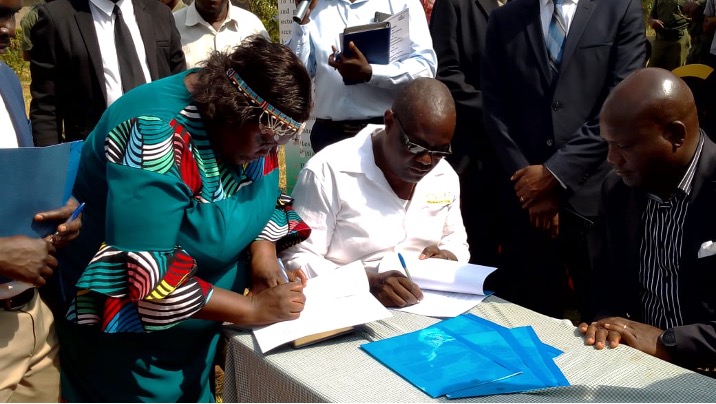Governor’s Day with Farmers – an innovative governance tool to bring more local agri-food actors to the policy table
Highlights of the 2nd Governor's Day with Farmers, Kakamega County Kenya
by William Onura, Larissa Stiem-Bhatia | 2023-03-28

Kakamega County, in the western part of Kenya, can be viewed as a text book case of unfulfilled potential. While it has not escaped the ravages of climate change, the county enjoys relatively high rainfall and an abundance of fertile land. Yet, according to the Kakamega County government, three out of ten county residents are food insecure.
Currently, policies to boost agricultural production and farm-based livelihoods rarely involve farmers and other community-level stakeholders who experience these realities every day. However, farmers need – and should – play a vital role in the governance of food systems (transformation). This disconnect was the trigger for an innovative county-wide initiative: Governor’s Day with Farmers.
A new model of practice-policy exchange
With support from TMG Research gGmbH and the German development organization GIZ, a network of local women and farmer organizations approached the Kakamega County government to propose a new approach for farmers to directly influence agri-food policy. Held for the first time in February 2022, Governor’s Day with Farmers (GDF) was convened by Shibuye Community Health Workers (CHW), a community-based women’s organization, the Kakamega County Farmers Association (KACOFA) – which is part of the umbrella Kenya National Farmers’ Federation – the Kakamega Youth Agripreneurs, and the county government.
The GDF was conceptualized as more than an event. It aims to become a county-wide (and eventually national) platform through which farmers can interact directly with the political leadership in the agri-food sector to address their concerns and interests. Farmers’ issues are presented in the form of a declaration, which is endorsed by the Governor, other top policy makers, and farmer representatives at the close of the Day. As highlighted by Violet Shivutse, Director of Shibuye CHW, the declaration is more than a piece of paper. The ultimate goal is to ensure that issues raised by farmers are taken up in the county planning process, so they can become mainstreamed in county budgets and programme implementation. Reflecting on the first GDF, she expresses pride that upon signing the first Declaration, “… the Governor even instructed the county minister of agriculture to go ahead and give us someone from the county who can work with us as communities, as farmers, to ensure that it goes into the [county development] plan.”
The 2023 GDF Declaration highlighted the following issues of concern: extension service delivery, access to land, farmer representation in policy making and county flagship projects and soil health, and markets. Governor Barasa affirmed his commitment to improving extension services as a key priority. This was further underlined by county agriculture minister Benjamin Andama, who noted the reason: “The issue of extension is key because that's where information is going to be disseminated and that's where we are going to reach that farmer.”
Governor’s Day with Farmers: Influencing policy from the bottom up
With so many farmers’ fairs and multi-stakeholder platforms mushrooming in the country, one might wonder what is unique about the GDF.
Broadening the base: The successful conclusion of the second Governor’s Day with Farmers has shown the potential of this process to evolve into a truly farmer-driven, and collaborative initiative. While the first GDF was largely organized and funded as part of a TMG research project, this year's edition was entirely led by local farmers and civil society organizations – with women as a key driving force. Moreover, a broader and more diverse set of co-host organizations was involved in planning and organization of the event, including Masinde Muliro University of Science and Technology, Anglican Development Services, Cereal Growers Association, and Transparency International.
Growing legitimacy: Second, the GDF has significantly grown in size in just one year, indicating its potential to continue to magnify farmers voices, strengthen their negotiation power and put pressure on politicians to live up to their commitments. Around 2,000 farmers – double the number of at the inaugural edition – witnessed the signing of the farmers’ declaration by their Governor. As noted by Violet Shivutse, the high number of farmers – and potential voters – really matters: “So the number of farmers showing up to the governor's Day already exerts pressure on the governor to say: Oh look here, we are watching, we want you to do this.”

Governor Barasa watches as Violet Shivutse, Director of Shibuye CHW, and Habakkuk Khamaala, Chairperson of KACOFA, sign copies of the GDF 2023 Declaration. Photo credit: Boniface Mmbeshi, Shibuye CHW
Strengthening accountability: Third, the GDF provides a unique opportunity for direct interaction between farmers and the top policy makers. As observed by Jael Omunyang’oli, County Assembly member, the objective of GDF is “… number one, to have a sit down, or round table engagement, with the policymakers to ensure that if there's any legislation that is pending, if there's any idea, they want to put forth for the policymakers, it can be tabled on that day.”
The continuing success of Governor’s Day with Farmers will, however, depend on the extent of effort made in preparing for and following up with the relevant stakeholders. The process did not end with the celebration at Bukura Agricultural Training Centre, as noted by Habakkuk Khaamala, KACOFA Chairperson, but requires intensive follow up. He emphasized KACOFA’s commitment to continue to engage the county government through the Ministry of Agriculture, “…to make sure that all the topics on the declarations have been acted on.“
Towards a governance tool for food systems transformation
Food and nutrition security, intact ecosystems and sustainable rural development are becoming more crucial as the world faces increasing hunger, climate change and ecological degradation challenges. In an effort to transform our food systems, policy makers, researchers, and programme implementers are pondering on the question of how such transformation processes can be governed while ensuring the relevant stakeholders have a seat at the table. The Governor’s Day with Farmers can be one piece of this puzzle by giving farmers and local communities a strong voice. Habakkuk Khaamala, Chairperson of KACOFA, sees a lot of potential in the GDF, not only in Kakamega, but the entire country. “If we have many counties having the Governor's Day, it will become a strong farmers’ movement and better show how [policy makers] can assist the farmers and include them even further in policy making.”
This article was written in the context of the TMG Research gGmbH project Governance of Food System Transformation, a three-year research project funded by the German Federal Ministry for Economic Cooperation and Development.
Edited by Wangu Mwangi
 Urban Food FuturesFeb 09, 2026
Urban Food FuturesFeb 09, 2026Pushing the horizon: Urban farming and community-led innovation in Mukuru informal settlement
A small community-run greenhouse in Mukuru is offering insights into how controlled-environment agriculture can strengthen food security in urban environments under increasing pressure—and a look into the future of food systems in informal settlements.
Christian Sonntag, Emmanuel Atamba, Lumi Youm
 Land GovernanceDec 18, 2025
Land GovernanceDec 18, 2025Land tenure, women’s land rights, and resilience: Reflections from CRIC23 toward UNCCD COP17
Our experts discuss what the exchanges at CRIC23 highlighted and revealed about the role of secure and gender-equitable land tenure in the UNCCD's work ahead of the 2026 triple COP year.
Frederike Klümper, Washe Kazungu
 Urban Food FuturesDec 09, 2025
Urban Food FuturesDec 09, 2025The story of Mukuru's Urban Nutrition Hub
In Mukuru informal settlement, a safe haven for women has grown into the Urban Nutrition Hub, a multi-purpose space for nutrition education, training, and community development, demonstrating the potential of grassroots community-owned innovation..
Serah Kiragu-Wissler


